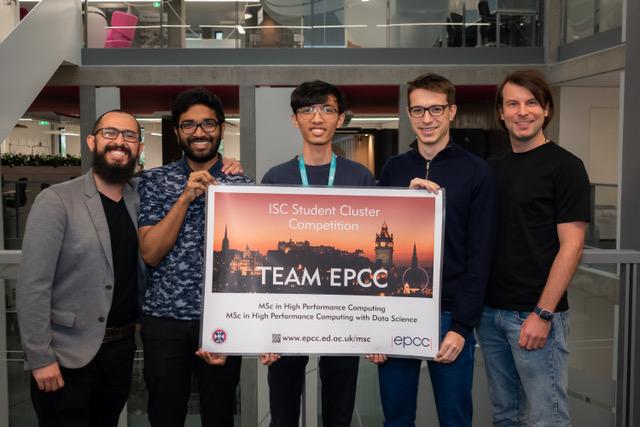TeamEPCC gears up for the Student Cluster Competition at ISC23
17 April 2023
Five students from our MSc programmes in High Performance Computing, and High Performance Computing with Data Science will compete in Hamburg in May.
This year the ISC23 Student Cluster Competition (SCC) has a number of student teams competing both online and in-person, with TeamEPCC being one of the seven teams selected for the on-site competition, which will take place from 22–24 May in Hamburg, Germany.
ISC SCC is an annual event for all the selected student teams to demonstrate their abilities to design their own clusters and achieve the best performance on a selection of benchmarks and scientific applications within a certain power usage limit. Taking part in the competition is a great opportunity for our students to push their skills and knowledge of high-performance computation in a realistic, high-stakes environment.
This year the benchmarks and scientific applications for the ISC23 SCC include HPCC, HPCG, HPL, Pot3D, FluTAS, and Quantum Espresso. These complex and demanding benchmarks and scientific applications require our team to carefully consider different aspects for design and optimisation, to prepare for the competition. As the power limit has been increased from 3kW to 6kW this year, it will allow for a boost in hardware architecture and will require the team to adapt their optimisation techniques, compared to previous competitions.
With the support from our sponsor, Hewlett-Packard Enterprise (HPE), and the EPCC systems team, TeamEPCC has designed a cluster specifically tailored to meet the computational demands of this year’s benchmarks. While multiple designs were extensively considered, the team decided on a GPU-dominated cluster, as most of this year’s codes can be GPU accelerated. While this promised the best overall performance, balancing power-constraints is an ongoing challenge. Our SCC cluster for this year will have two nodes, each equipped with eight NVIDIA A100s GPUs, dual-socket AMD 7717 64-core CPUs, and 1TB RAM. To keep the system’s temperatures in check on the conference floor, the HPE Apollo d6500 Gen10 chassis employes fifteen 80mm high-RPM fans.
To better prepare for the ISC23 SCC, TeamEPCC will also visit EPCC's Advanced Computing Facility where the competition cluster and several UK national HPC systems, such as ARCHER2, Cirrus, and Tesseract, are located. The visit will provide the team with the opportunity to learn how to perform basic hardware maintenance and understand the constituent components and the cooling mechanisms.
TeamEPCC is ready to showcase what they have learned at EPCC and see how they could measure up against the world-class teams that will be attending the ISC23 SCC. While aiming to excel in the competition, the team also looks forward to the unique opportunity to network with academic and industrial experts in the HPC world and engage with other teams from around the globe at ISC23.
We would like to thank HPE for being TeamEPCC’s sponsor again for the ISC23 SCC.
Follow the team's progress
You can keep up with TeamEPCC on Twitter: @teamepcc
Photo shows TeamEPCC at EPCC's offices in the Bayes Centre: (left to right) Tomas Rubio Cruz, Jaffery Irudayasamy, Ikraduya Edian, Hristo Belchev, and Oleksandr Piekhota.


